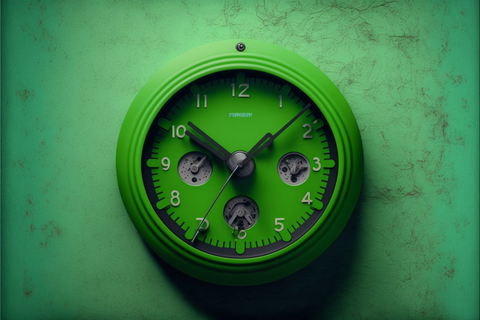Wall clocks are a great way to keep track of time, and they can be a great addition to any home décor. However, not all wall handmade clocks run on batteries. Many of them must be plugged into an outlet. Depending on your preferences you can choose battery-operated wall clocks or those that need an outlet or even solar energy.
Battery Operated Wall Clocks
There are many different types of wall clocks and all clocks use gears, and they all have different features. Some wall clocks are battery-operated, while others are not. Battery-operated wall clocks are a great option if you want a clock that is easy to maintain and that will last for a long time.
These clocks are also very convenient because you do not have to worry about plugging them in.
Wall clocks that are not battery-operated are a good choice if you want a clock that is more decorative.
These clocks can be made from a variety of materials, including wood, metal, and glass. They can also be designed with a wide range of styles, from traditional to contemporary. Battery-operated wall clocks are convenient for areas where there is no electrical outlet available.
If you are shopping for a battery-operated wall clock, it is important to read the product description carefully. Some battery-operated clocks are designed for indoor use only. Others can be used both indoors and outdoors. Be sure to select the clock that is best suited to your needs.

Other Types of Wall Clocks
Some wall clocks are powered by electricity, while others use a mechanical movement that is powered by weights or springs.
The type of power source that a wall clock uses will determine how accurate it is.
They use a Quartz crystal to keep time and are not affected by changes in temperature or humidity.
They are not as accurate as electric wall clocks, but they are more reliable. Mechanical wall clocks are powered by either weights or springs.
Electric wall clocks are the best choice for use in a home or office. Mechanical wall clocks use a pendulum to keep time. They are not as accurate as electric wall clocks, but they are more reliable. Mechanical wall clocks are powered by either weights or springs.
Digital Clocks
If you have ever wondered whether all wall clocks run on battery, the answer is no! Digital clocks are the most common type of wall clock, and most of them do not run on battery. However, there are a few digital clocks that do require a battery. The most important factor to consider when deciding whether or not a digital clock needs a battery is the type of display. If the digital clock has an LED or LCD display, it will not need a battery. These types of displays are very energy efficient and can run for years without a battery. However, if the digital clock has an old-fashioned CRT display, it will probably need a battery.
Solar Powered Wall Clock Type
Solar-powered wall clocks are a great way to keep track of time while being environmentally friendly. These clocks are powered by the sun, so they don’t need batteries or electricity to run. Solar-powered wall clocks are available in a variety of styles and sizes, so you can find one that fits your décor. Some of these clocks even come with special features, such as alarms and temperature displays.
Key-Wound Clocks
Some clocks, like key-wound clocks, need to be wound up periodically in order to keep running. Key-wound clocks are powered by a mechanism that needs to be wound up in order to keep the clock running. This is done by inserting a key into the clock and turning it. The clock will then run for a certain period of time before it needs to be wound up again. Key-wound clocks are not as common as they once were, but they can still be found in some homes and businesses. If you have a key-wound clock, be sure to wind it up regularly to keep it running properly.
Atomic Clocks
Atomic clocks are the most accurate timekeepers available, and they’re used in many applications where precise timekeeping is critical, such as in air traffic control and navigation. They rely on the natural oscillations of atoms, which are incredibly stable and precise. By harnessing this natural phenomenon, atomic clocks can keep time with amazing accuracy.
Electric Wall Clocks vs Battery-Operated Wall Clocks
One of the most important decisions you'll make when choosing a wall clock is whether you want an electric or battery-operated clock. Both have their pros and cons, so it's important to know the difference before making a decision.

Here's a quick rundown of the differences between electric and battery-operated wall clocks.
Electric wall clocks are more accurate than battery-operated wall clocks.
They are also more reliable because they don't rely on batteries.
Electric wall clocks are also more energy efficient On the other hand, if there is a power outage, an electric wall clock will stop working, but a battery-operated wall clock will continue to work.
Another advantage of battery-operated wall clocks is that they are easier to install. You do not need to worry about finding a place to plug it in. All you need to do is put in batteries and you are good to go. Finally, battery-operated wall clocks tend to be more accurate than electric wall clocks. This is because they are not affected by power fluctuations. Electric wall clocks can lose or gain time depending on the power.
Wind-Up Wall Clocks
These clocks are powered by a spring mechanism that needs to be wound up periodically, and they offer a level of precision that battery-operated clocks simply can’t match. Plus, there’s something satisfying about the “tick-tock” sound that a wind-up clock makes.
Additionally, they're eco-friendly. Wind-up clocks don't require batteries, which means they don't add to electronic waste. They're cost-effective. You don't have to worry about buying batteries or replacing them every few months. They're reliable. There's no risk of your clock stopping in the middle of the night because the batteries died. They're stylish. Wind-up clocks come in a variety of styles, from antique to modern.
Final Thoughts
No, not all wall clocks need batteries to run. Some of them are powered by electricity from an outlet, while others use a key wind-up mechanism. It really depends on the specific clock that you have. There are pros and cons to both battery-operated and non-battery-operated clocks. It really just comes down to personal preference in the end. Be specific in your preferences while purchasing a wall clock.
Commonly Asked Questions
What happens to clocks when their batteries become very low?
Clocks may stop working or may run slower than usual.
What would cause battery-powered clocks (wall-hanging type) to malfunction?
There are many possible causes for battery-powered clocks to malfunction.
Some common causes include dead batteries, incorrect battery type, loose battery connection, or dirty battery contacts.
How do modern battery-powered wall clocks work?
The battery-powered wall clock generally has a small pendulum that is electrically powered.
The electrical power is supplied by a battery, which is connected to the clock mechanism.
The battery supplies the power to a small motor that turns the hands of the clock. The motor is regulated by a small electronic circuit that controls the speed of the motor.
Why did electric wall clocks stop being produced?
One reason is that the technology became dated and was no longer seen as cutting-edge. As digital clocks became more prevalent, electric wall clocks lost their appeal. Additionally, electric wall clocks were more expensive to produce than digital clocks, so manufacturers began to focus on producing more affordable digital clocks.
Are battery-powered clocks just as reliable for the correct time?
Most battery-powered clocks use a quartz crystal to keep time. Quartz is an electrical conductor that vibrates at a very precise frequency when voltage is applied to it. The frequency of the vibration is used to keep the time on the clock accurate. The quartz crystal in a battery-powered clock will usually stay accurate to within a few seconds per month.
ABOUT THE AUTHOR
Aleksandra Djurdjevic
Senior Content Creator
Aleksandra Djurdjevic is a senior writer and editor, covering jewelry, accessories, and trends. She’s also works with services, home décor. She has previously worked as ESL teacher for English Tochka. Aleksandra graduated from the Comparative Literature department at the Faculty of Philosophy in Serbia. Aleksandra’s love for the environment, crafts and natural products over the years helps her continue to be a top expert at Wooden Earth.






